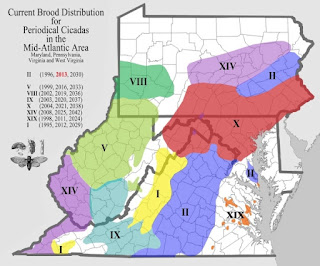 |
| public domain image via WPClipArt |
However, we're here to celebrate Cheverly Day, and one very special thing about this area is the occasional influx of cicadas that coincides with Cheverly Day. So here it is: we're celebrating cicadas. Our annual 5k race/2k fun walk takes its name from the 17-year brood...you may really be stomping on them at this year's Cicada Crunch, too!
Brood II should be hatching any day now, so we'll say that chances are very good that you'll come face to face with a few this Saturday. Some watchers, such as ABC 7's Lauren Ricketts, are predicting a smaller-than-normal hatching in the close-in DC suburbs. Entomologist Michael Raupp from the University of Maryland agrees. He a wonderful cicada map for our region that puts the nearest emergence of Brood II in Calvert, St. Mary’s, Fairfax, Fauquier, and Prince William Counties. Professor Raupp's website Bug Of The Week, shows "the blue/purple color 'II" are the locations that are mostly likely to be severely impacted by the cicadas this year"
 |
| map via ABC 7 |
You can keep track of hatching here. And The Washington Post has published very interesting, helpful advice, too.
We also like The Atlantic Wire's take on our airborne friends. Among their suggestions, go to the beach (though definitely not this weekend!), have fun, and keep a little healthy perspective. After all,
Okay. We've mustered as much healthy enthusiasm as we can. We're trying. Really, we are. Yay, cicadas!Cicadas aren't dangerous at all. They don't bite or sting. They are here to make babies! The males just fly around from tree to tree, playing their love songs in the hopes of wooing a lady with whom to make babies. Four-hundred of them at a time. Maybe more. So, yeah, not exactly cuddly, but still.But, really, if you think about it, bugs are everywhere all the time. "The density of cockroaches in Manhattan is far greater than the density of cicadas," Cooley assured us. "There are several million per acre, probably — they just aren't all noisy and flying around." That's obviously disgusting as well, but he's right: Roaches are all around us, all day. And, well, we hate to say it, but there will actually be way more cicadas lurching around at the end of the summer, once the mommy cicadas lay their eggs. And you won't even notice the babies! The little ones are so tiny that they don't even fly around, and they certainly don't sing super-loud sex music.Also, it's time to stop being so selfish. Cicadas will be great for the environment. "It's going to be a tremendous boom year for anything that can eat cicada," Cooley explained. From pigeons to ants, the animals around Brood II are going to feast. So there's that.
(A big thank you to Glen Barton for suggesting this post!)

No comments:
Post a Comment